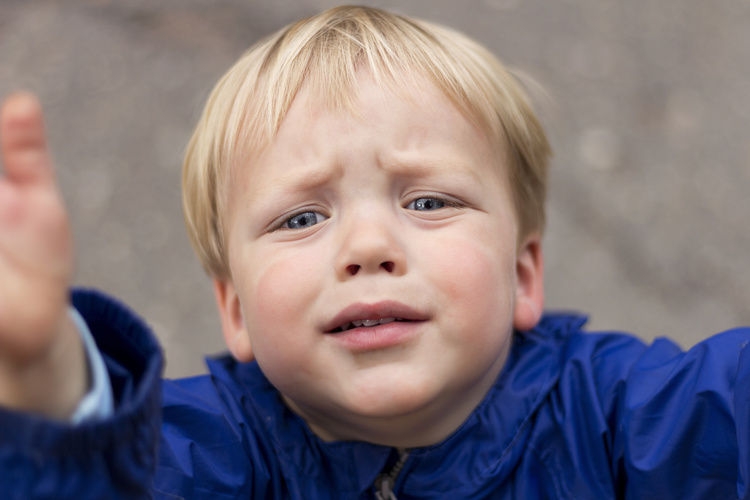Separation anxiety is a normal part of development. It involves a child becoming distressed when they are separated from their primary carer. Part of this is instinctual – if babies weren't nervous about being apart from their caregiver, they may crawl or walk away into unsupervised situations.
A little bit of separation anxiety can be healthy between the ages of around eight months up to two years of age. If separation anxiety persists throughout early childhood and remains severe, your little one may have a separation anxiety disorder, which can be managed with the help of professionals.
How do I know if my child has separation anxiety?
When your child is about to be separated from you, such as being dropped off at day-care or school, they may be experiencing separation anxiety if they:
- Throw a tantrum
- Cry
- Behave very shyly
- Refuse to go to the new place
- Complain of a sore stomach or headache
- Refuse to speak to the secondary caregiver (child care worker or teacher etc.)
- Physically cling to you
- Vomit
- Have trouble getting to sleep (separation anxiety at bedtime)
- Express concerns that one of you will be injured while you're separated, i.e. fear you will be in an accident
- Express concerns that the separation will be permanent
Separation anxiety is a normal part of the development and a lot of these emotions are quite common, especially as your child settles into a new place such as day-care or preschool.
How do I know if my child has a separation anxiety disorder?
Separation anxiety disorder can affect 4% of preschool and school-age children. This disorder has many of the same symptoms as normal separation anxiety, so it can be difficult to tell the difference. Your child's anxiety might be a disorder if:
- It is occurring after two years of age
- Its severity increases or seems much more severe than its peers
- Interferes with their daily life, like making school drop off very long or difficult
- Interferes with your daily life in extreme ways, such as making you frequently late to work
- Lasts consistently for longer than four weeks, particularly in children over two
If you think your child may have a separation anxiety disorder, chat to your GP or paediatrician, or ask for a referral to a mental health worker or anxiety specialist.
How can I help my child through separation anxiety?
You can help support your child through their separation anxiety by:
- Spending time with them in a new place before you leave them there. Take a tour together of their new school before their first day, or arrive at day-care early enough to stay and play with them for a little while before you leave.
- Helping them feel more in control by letting them make decisions on the day such as which shirt to wear or which snack to put in their lunch box (start by giving them options to choose from that you are already happy with, like two healthy snack options).
- Leaving them with a comfort item like their favourite toy.
- Demonstrating a positive relationship with their new temporary carer. Let them see you have a respectful and friendly conversation with their new carer to promote trust between you all.
- Setting expectations of the day, such as 'Today you will learn new things and get some time to play in the sandpit, and I'll be back to get you before you know it.
- Re-assuring them that you will be back and giving them a timeframe to expect. It is important you try your best not to be too late to pick up your child.
- Keeping goodbyes brief. Avoid getting emotional yourself; be a role model for confidence and calmness.
- Establishing a goodbye routine, such as saying 'see you soon!' and kissing each other on each cheek. A stable routine can help reduce anxiety.
- Providing lots of positive reinforcement after they've been separated from you. Let them know they've been brave and ask them about their day.
- Communicating with their new carer about what might help them calm down, such as playing with their comfort item, or a reminder of when you are getting back.
- Acknowledging your child's feelings. Don't make them feel like they're being silly or dramatic; the anxiety is very real for them and feeling understood can help.
- Leaving them notes in their lunchbox.
- Helping them develop coping strategies, such as taking a deep breath and naming three things they can see and two things they can hear.
- Letting them know it’s okay to tell their carer when they are feeling sad, scared or sick.
- Establishing a bedtime routine and reminding your little one before they go to sleep that you will see them in the morning.
Separation anxiety shouldn't be a big concern unless you suspect your child may have an anxiety disorder. Whether they're experiencing standard developmental separation anxiety or displaying signs of an anxiety disorder, being open with your child about their feelings is a great way to support them.
You might want to try the tips from the list above, and do your best to remind your little one that everything will be okay and that you love them and will see them soon. Most children will grow out of standard separation anxiety by about four years of age but if you are worried about your child’s separation anxiety, seek professional help – a psychologist or anxiety specialists are a great help and your GP or paediatrician could also assist.
Recommended Articles:
https://www.babybunting.com.au/baby-talk-blog/the-importance-of-play-in-childhood-development/
https://www.babybunting.com.au/baby-talk-blog/bonding-with-your-step-child/



